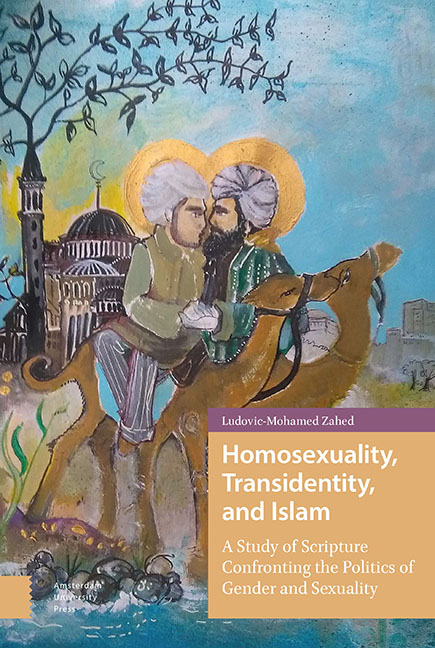 Homosexuality, Transidentity, and Islam
Homosexuality, Transidentity, and Islam Book contents
- Frontmatter
- Contents
- List of Figures
- Acknowledgments
- Foreword
- Introduction
- I The Qur’anic Ethics of “Nature”: Gender, Sexuality, and Diversity
- II Distressing Qur’anic Verses?
- III The Prophet: A Living Incarnation of Qur’anic Ethics
- IV Islamic Apocrypha Advocating the Stoning of “Sodomites”
- V Postcolonial Orientalisms
- VI “Abnormals”: From Cultural Diversity to Dogmatic Uniformity
- VII Towards a Structural Reevaluation of Cultural Values
- VIII Pan-Arabist Literary and Identity Censorship
- IX Orientalist Shi’ism and Literary Homoeroticism
- X Homonationalism and Performative Sexual Categorization
- XI A “Crisis” of Categories, Geopolitics or Civilization
- Conclusion
- Afterword
- Bibliography
- Index
II - Distressing Qur’anic Verses?
Published online by Cambridge University Press: 20 November 2020
- Frontmatter
- Contents
- List of Figures
- Acknowledgments
- Foreword
- Introduction
- I The Qur’anic Ethics of “Nature”: Gender, Sexuality, and Diversity
- II Distressing Qur’anic Verses?
- III The Prophet: A Living Incarnation of Qur’anic Ethics
- IV Islamic Apocrypha Advocating the Stoning of “Sodomites”
- V Postcolonial Orientalisms
- VI “Abnormals”: From Cultural Diversity to Dogmatic Uniformity
- VII Towards a Structural Reevaluation of Cultural Values
- VIII Pan-Arabist Literary and Identity Censorship
- IX Orientalist Shi’ism and Literary Homoeroticism
- X Homonationalism and Performative Sexual Categorization
- XI A “Crisis” of Categories, Geopolitics or Civilization
- Conclusion
- Afterword
- Bibliography
- Index
Summary
Abstract
In light of the historiographic context and theaxiological principles the author has nowdescribed, there are five important points tohighlight about the representation of “sodomy” inthe Qur’an.
Keywords: sodomy, ritual rapes,Sodom and Gomorrah, patriarchy
Al-Tabari, one of the first and most famous exegetes ofthe classical age, exclusively associates the“abominable” practices of “sodomites” with analintercourse between men. He bases his analysis onthe following verse: “Indeed, you approach men withdesire, instead of women. Rather, you are atransgressing people” (Qur’an, 7:81). Yet, thepractices of the people of Lot, as described by theQur’an, are not the expression of consenting love,but of concupiscence and a form of droit du seigneur (jus primae noctis) exercisedunilaterally by patriarchs on partners who, presumably, wereunwilling. Furthermore, Al-Tabari does not evenattempt to ground his exegesis in a systematic – orsystemic – analysis of all the verses of the Qur’anthat directly or indirectly deal with this precisequestion. This is perhaps explained by the fact thatAl-Tabari was a jurist and not a historian devotedto the precise analysis of the sociopoliticalcontext in which these events took place. Thus,based on a literal and incomplete exegesis,Al-Tabari begins from the problematic premise thatcertain verses of the Qur’an unambiguously condemnwhat we call “homosexuality” today, beforesubstituting his definition of “sodomy” for theQur’anic “abomination.”
In contrast, Amreen Jamal (2001) adopts a method ofsemantic analysis, inspired by an expert in thefield, the philosopher and scholar of IslamToshihiko Izutsu (2002), in order to determine ifthis “abomination” is exclusively linked to sexualacts, in particular to alternative andnonheterosexual ones. Through his analysis, Jamalconcludes that the term has nothing to do with anexclusively sexual abomination, but with a violentand patriarchal form of paganism. Al-Tabari did notseek to undertake a comparative and systemic studyof this type of terminology in the Qur’an. As ajurist, however, he owed it to himself to make thelink, one way or another, between the text of thehadith and so-called “Islamic” jurisprudence, whichin reality was established by the first caliphs andthen by their more or less inspired successors.
- Type
- Chapter
- Information
- Homosexuality, Transidentity, and IslamA Study of Scripture Confronting the Politics of Gender and Sexuality, pp. 25 - 32Publisher: Amsterdam University PressPrint publication year: 2019


